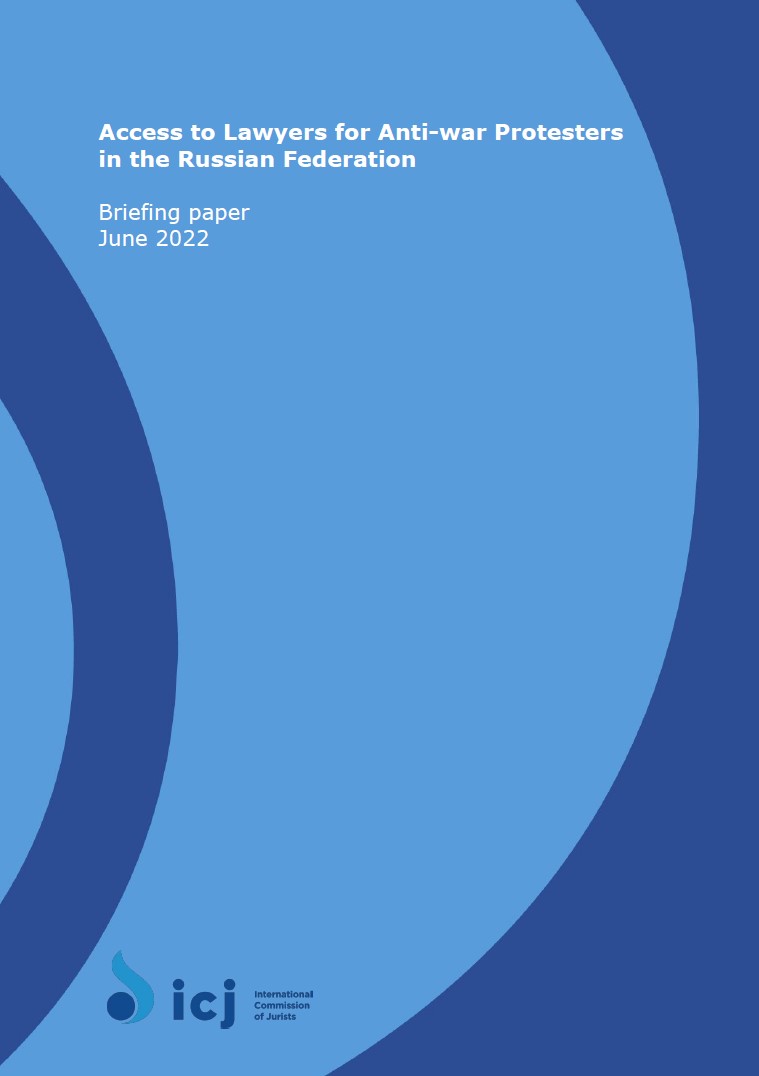The months following the Russian Federation’s military invasion in Ukraine have been marked, in Russia itself, by a wave of protests against the invasion and systematic official suppression of expressions of opposition to the invasion. The government has hastily adopted new restrictive laws limiting expression of views on the conflict, followed by immediate enforcement through thousands of mostly arbitrary arrests and criminal charges related to the protests. In many cases, those arrested have not had access to prompt and confidential legal advice, and their right to an effective defence in court has been impeded. While obstruction of the work of lawyers in defence of human rights is a long-standing problem in Russia, the problem has become particularly acute in relation to the recent arrests of protesters.
The ICJ briefing paper published today addresses some of the barriers to access to a lawyer, and harassment and obstruction of the work of lawyers defending protesters, which have compounded violations of human rights of protesters, violating Russia’s obligations under the European Convention on Human Rights (ECHR) and the International Covenant on Civil and Political Rights (ICCPR) as well as the rights of the lawyers themselves and international law and standards concerning the legal profession.
The Russian Federation must ensure that the rights of protesters and their lawyers are respected at every stage of administrative and criminal proceedings, including at police stations and courthouses. The ICJ stresses that there must be no impediment to the exercise of professional duties by lawyers, and that obstacles to the work of lawyers violate fair trial rights and undermine the justice system’s ability to protect human rights.
In particular the ICJ recommends that:
- The executive and legislature should repeal criminal law provisions that impose vaguely worded and disproportionate restrictions on freedom of assembly and expression
- Pending such repeal, the police, prosecutors, and courts should adopt restrictive, clear and predictable interpretations of criminal conduct under these provisions, in accordance with international human rights law principles of legality, necessity and
proportionality - Law enforcement authorities should issue and enforce clear instructions to their officials to refrain from obstructing access of lawyers to police stations
- Law enforcement authorities should refrain from applying restrictive regimes, such as the “Fortress” plan outside of the most extreme circumstances of imminent terrorist attack. The plan should not be applied in response to the arrest of anti-war protesters or to unduly restrict access to lawyers.
- Law enforcement officials should ensure that detainees are able to meet and communicate with their lawyers expeditiously and in private without any impediments, restrictions and without additional extra-procedural authorization requirements from any quarter. Officials who order denial of access to lawyers, or prevent such access contrary to national law, should face disciplinary action.
- Judges, bailiffs and other court staff should ensure that lawyers have unimpeded access to court buildings and court rooms where the cases of their clients are heard.
- Courts should not tolerate practices where access of a lawyer to a client is obstructed contrary to the law.
- Where attacks on lawyers occur, prompt, thorough, impartial and independent investigations into such incidents should be carried out which should, where appropriate, result in bringing those responsible to justice.
Read full text of the briefing paper in English here




